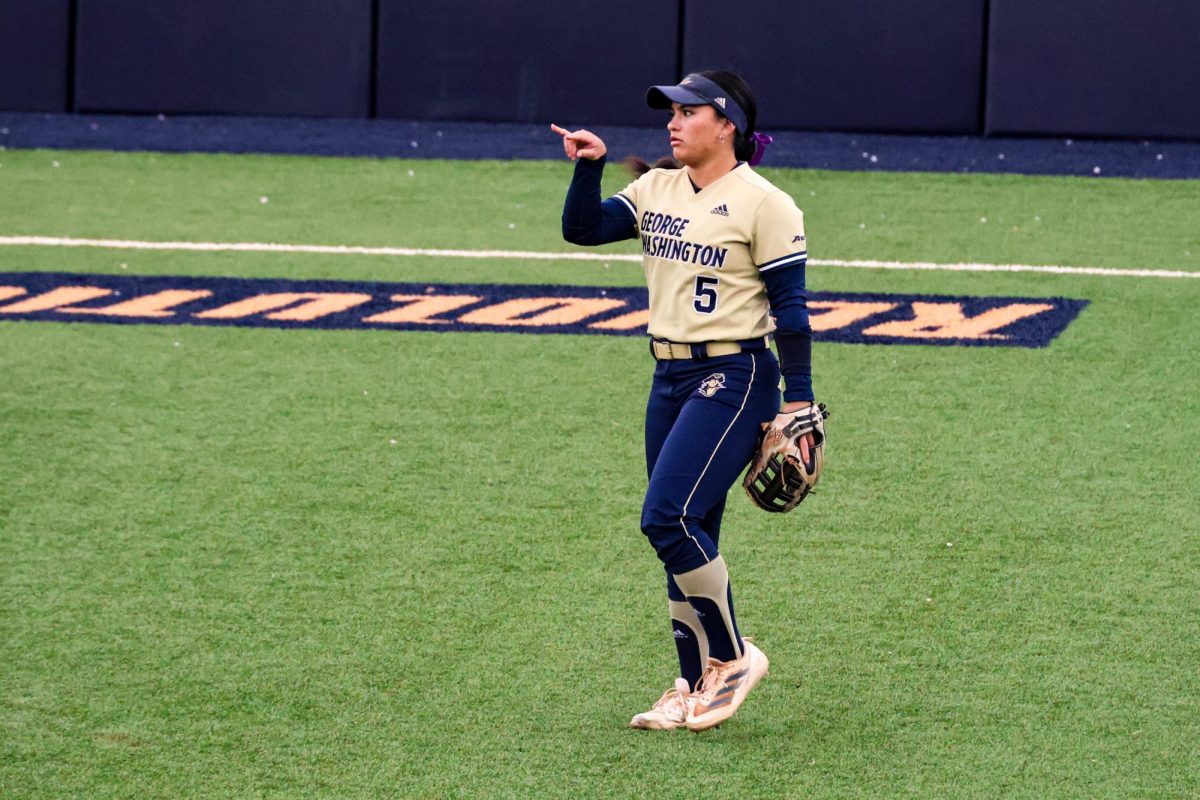For as long as he can remember, Byron Kerr had a knack for sports commentary.
As a kid, Kerr said he would turn down the volume on his TV while watching NBA games, take out his cassette player and call the games himself. While shooting hoops on his own, Kerr said he would call out the play-by-play in his driveway.
Today, Kerr serves as the play-by-play announcer for men’s basketball on the radio, and more recently, ESPN+. Now 15 years into the gig at GW, Kerr still considers calling Colonials games a “dream job.”
“I always remember that moment when the first ball goes up to begin a season, and I get the butterflies in my stomach because I’m like, ‘This is so much fun,’” Kerr said. “I’m really lucky to be able to be the voice of GW and to call games.”
He got his start behind the mic while a student at Virginia. Kerr was the public address announcer for non-revenue sports, and he spent time as a sports anchor at a college station. For his first job after graduation, he called play-by-play for high school basketball games.
Then in the early 1990s, Kerr broke into the Atlantic 10 scene as an expert commentator for George Mason’s home men’s basketball games. After a few years, he became the team’s primary play-by-play announcer – a position he held for more than a decade.
While with the Patriots, Kerr became acquainted with GW’s play-by-play announcer, Larry Michael, who he asked to give a heads up if the position to call games for GW became available.
The job opened up in 2005, when Michael moved on to become an announcer for the now-Washington Football Team, and Kerr soon found himself calling games for a men’s basketball team that finished 27-3 during the 2005-06 season.
“They were just an amazing team,” Kerr said. “That shot put me into that, and I’ve been with the Colonials ever since and really, really loved calling the games and coming to Foggy Bottom.”
But as with most aspects of life throughout the COVID-19 pandemic, Kerr’s broadcasting routine has changed this year. In addition to men’s basketball, Kerr added women’s basketball games to his docket, and he undergoes regular COVID-19 testing and wears a mask while speaking into the microphone.
With restrictions to both access and travel, Kerr now only handles home games, which he said has affected his relationship with players and coaches that help him see how the team is progressing on and off the court.
“When I’m traveling with the team, I get an inside view of how the players are doing, what’s going on with the coaches,” Kerr said. “I get to go to the shoot arounds and practices to see what the emotion of the season is, what they’re working on, what they’re trying to improve on, how the players who are injured are trying to get better. None of that is available right now.”
Aside from restricting his behind-the-scenes access, the safety protocols in place at the Smith Center have also shifted Kerr’s day-to-day routine. Taking a COVID-19 test each week prior to games, Kerr said he now only interacts with two or three people every time he calls a game.
“As a father of three children and a wife at home, you definitely get nervous going out into the world and hoping that you don’t contract something like COVID-19,” he said. “But being tested once a week kind of makes me feel a little bit better.”
Along with the weekly testing, Kerr wears a mask at all times inside the Smith Center and keeps hand sanitizer nearby. Unlike past seasons, he said he now needs to remain cognizant of when his mask rubs against the microphone during broadcasts. Kerr’s vantage point has also shifted from a courtside view to the upper corner of the Smith Center.
“You have to stand up sometimes to see what’s going on on the baseline,” Kerr said. “It’s a little bit different.”
Kerr added that the most stark difference for him and the student-athletes has been adjusting to the absence of fans inside the Smith Center. Nowadays, the public address announcer reads the starting lineup to cardboard cutouts of fans rather than George’s Army in the student section and the other attending fans.
“That’s the toughest part, I think, is being unable to have the fans enjoy those moments,” Kerr said. “The players feed off the fans in the stadium, so they have to generate their own emotions sometimes because they don’t have the students. They don’t have fans there to help them through a tough time.”
Despite the adversity this season, Kerr said he still “loves” calling GW games. Without fans watching the action in person, Kerr said his role has only become more important.
“It’s a valuable position to be in, to try to help people see how the teams are doing and what they’re doing in the games,” Kerr said. “That’s exciting for me to be able to have that responsibility to pass on all that information, to help people, at least for a two hours, escape what they’re going through and root for GW.”
Emily Maise contributed reporting.







